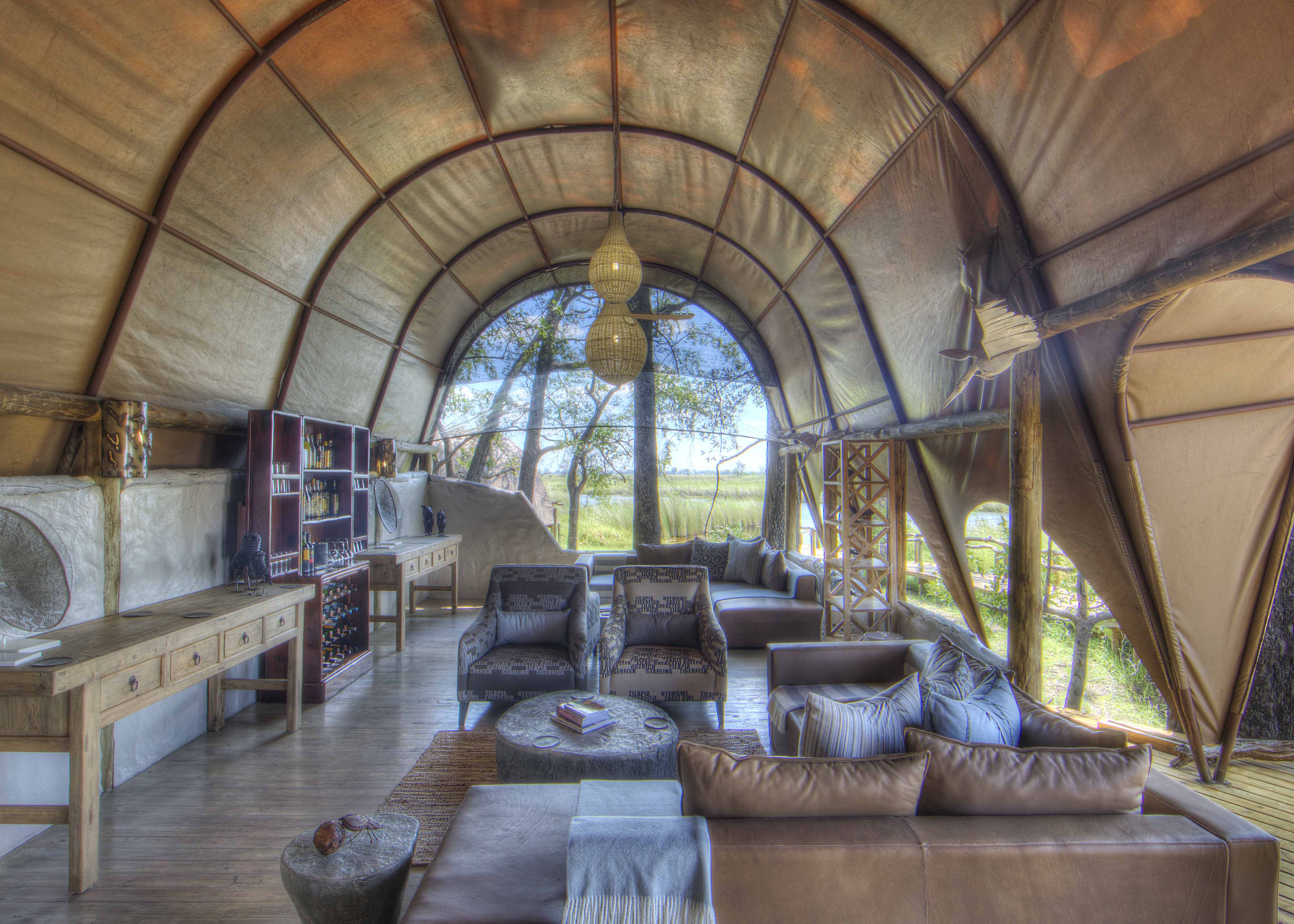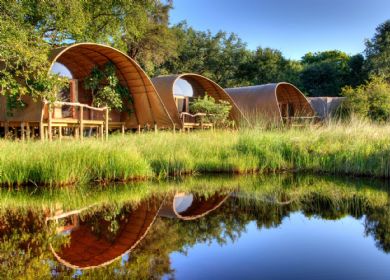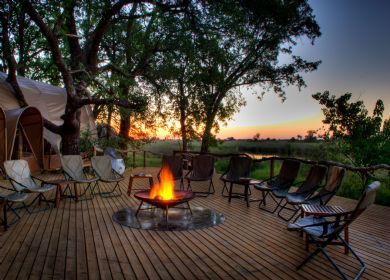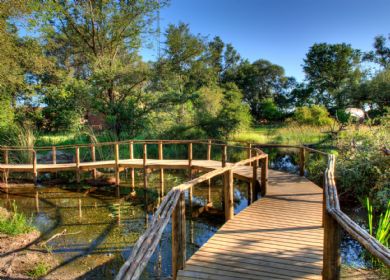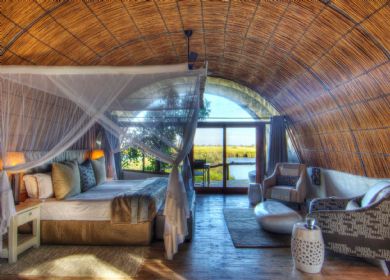
The best time to visit depends on what safari experience you are looking for and your tolerance of the varying weather conditions.
WINTER months (June, July and August) are marked by cloudless days and mild temperatures (average is 5-27°C).
In the Okavango Delta, the floodwaters from Angola start to fill the countless lagoons and streams, in turn the landscapes outside the Delta begin their drying process, gradually fading from lush green to dry khaki. In the Central Kalahari temperatures may drop below 0°C during the night.
SPRING months (late August through September) are a wonderful time to visit Botswana. The timing, between the cold of winter and the intense heat before the rains, ensures temperatures of 15-31°C. It heats up toward the end of September and into October where highs can reach above 40°C. Game viewing is excellent due to the lack of thick vegetation and the water holes are drying up.
SUMMER months (November, December through to March) enjoy temperatures averaging 16-35°C. These months include the rainy season (generally January/February), when you may encounter brief but heavy rain and thunderstorms.
This period can offer excellent game viewing and you may be lucky to witness the miracle that the rains bring, transforming the dry land to a vibrant abundance of lush greenery. Temperatures in the Central Kalahari may climb to above 40°C.
AUTUMN months (April and May) are marked by moderate temperatures, 15-30°C, which is a lovely time to visit Botswana with the lands lush and green after the summer rains.
Botswana is considered a safe travel destination and is both financially and politically stable having been spared much of the unrest and turmoil which plagues so many countries in Africa. As is the case elsewhere, the larger cities and population centres generally have the most crime, but once you are on safari, such problems are all but non-existent. It is, however, a good idea to leave your valuables (expensive watches, jewellery, etc.) at home thus eliminating the temptation for possible thievery. Luggage locks are always advisable when flying. Small safes are provided in each tent for items such as cash, jewellery and passports.
Citizens of certain countries are required to obtain visas for entry into Botswana. As this list of countries changes from time to time it is important to check with your travel consultant regarding current visa requirements, well in advance of your departure.
Other possible document requirements:
Immigration requirement for families travelling to Botswana.
• Parents travelling to South Africa and Botswana with children under 18 years old are required to produce an unabridged birth certificate (including details of the children’s father as well as mother) for all children travelling in addition to their valid passports. In the event that one parent is not travelling with the child, the other parent’s affidavit consenting to such travel should be availed. However, an affidavit will not be required if the father’s name does not appear on the child’s birth certificate. Adults travelling with children under 18 years old who are not the parents must produce a signed affidavit from both parents stating that the identified adult has been given their authority to travel with their child, said adult will need unabridged birth certificates for all children in their care.
Yellow Fever Vaccination.
• All travellers from or through the countries which have been declared yellow fever infected areas must provide an international health certificate of vaccination for yellow fever upon arrival into Botswana. A list of the yellow fever declared countries can be obtained from your safari designer.
You will be met at the airport in Maun. After passing through customs, you should look for a uniformed Ker & Downey Botswana representative with a sign showing Ker & Downey Botswana on it. The representative will then transfer you either to your flight to camp, your hotel or other appropriate destination.
Depending upon the time of year, lightweight clothing of cotton and cotton/blends are most suitable. During the winter months, it can be very cold and a warm/windproof jacket, along with hat, gloves and scarf will be needed for early morning and evening game viewing activities. During the summer months bring a lightweight water/windproof jacket in case of rain, but otherwise temperatures are very warm. For evenings bring lightweight long-sleeved clothing as protection from mosquitoes. Neutral colours such as khaki and olive green are appropriate and less conspicuous to the animals. Closed shoes are necessary for walking safaris.
Laundry is done daily in camp, so it is not necessary to over pack.
Dining in the bush is a delight in itself. A typical day’s menu might be as follows:
BREAKFAST
Assorted fresh fruit, cereals, yoghurts, homemade toast, (muffins or pancakes) with preserves, and a cooked breakfast to order, tea, coffee, fruit juice & a home-made fruit smoothie.
LUNCH
A delicious hot meat dish such as a local beef bobotie or honey mustard chicken skewers, for those who prefer a vegetarian option on offer you can enjoy a scrumptious lentil shepherd’s pie or baby marrow and chickpea fritters. There is always a choice of 3 salads; green salad, tomato, red onion and basil salad or avocado and paw-paw salad, home-made bread, a fruit bowl, a cheese platter, tea, coffee, soft drinks and wine.
DINNER
Three courses begin with a delightful tomato & basil soup and home-made bread roll. Options vary depending on the season. The starter is followed by kudu fillet with green pepper sauce, a vegetarian option of chickpea, potato and cashew nut curry, creamed potatoes, glazed carrots and green beans. For those with a sweet tooth, dessert maybe a chocolate cream with black cherries. The meal is rounded off with a cheese platter and tipple of port.
We will make every effort to cater to special dietary requirements, with advance notification. Packed lunches may be provided to guests out on a full day activity or transferring to their next destination. A children’s menu is on offer in each camp, the manager will be available to discuss the options ahead of mealtimes.
When travelling to any foreign destination, we strongly suggest that you check with your local immunisation authority, public health facility or personal physician to find out what immunisations and medications are required/suggested for your travels. Botswana is considered a malarial area, and preventative medications should be taken. You should bring any personal medications or prescription medications in your hand luggage.
Malaria including Plasmodium Falciparum exists in certain areas. All clients must consult with their own Medical Doctor, the Centre for Disease Control or their National Health Authority regarding the use of anti-malarial tablets prior to departure. There are many brands available and we recommend that clients consult their doctor, health clinic or health department as to which brand they should take.
In the case of a genuine medical emergency, Ker & Downey Botswana can have a Medivac aircraft dispatched to camp. Depending upon the needs of the patient, they will be transported to a local medical facility for treatment.
Minor medical needs can be treated in camp.
NOTE: Our Medivac coverage is restricted. It does not extend to those who have pre-existing conditions, are pregnant or are over 81 years of age. It is imperative that you arrange your own comprehensive travel/medical insurance policy prior to travelling.
Each of our camps has a reverse osmosis water treatment system that produces drinking water for the whole camp. The system is Botswana Bureau of Standards approved and is laboratory tested quarterly.
As part of our drive to reduce, if not eliminate plastics in our pristine environment we provide 500ml glass bottles for guests’ use, both in camp and out on activities. Each vehicle or boat has a cooler box containing chilled waterand an assortment of drinks. In camp the glass bottles can be refilled at any time from the chilled dispensers in the main areas.
Ker & Downey Botswana use Toyota Land cruisers which have been specially built for game viewing and photography. All have completely open seating areas and cabs for unhindered photography, roofs that can be removed for excellent bird viewing and star gazing on a night drive. Each has ample seating with camera mounts and storage compartments containing reference books, snacks, toilet paper, wet-wipes, hand sanitiser and insect spray along with a cooler box for refreshments. Window seats are guaranteed on game drives at Shinde, Dinaka, Kanana and Okuti.
When out on the waterways of the Okavango Delta you will be transported in either a fiberglass Mokoro or Swamp Cruiser motor boat. Life jackets are provided and guests are strongly recommended to wear them.
A solar powered system at Kanana, Shinde and Footsteps Camp, then generators at Dinaka and Okuti provides electricity. The solar power systems provide 24-hour electricity. Due to the noise of the generators, they are normally used during the day, when guests are out of camp. In the evenings, the generator is switched off and lighting is provided by battery. Camera batteries may be recharged in the guest tents during the day.
On our standard fly-in safaris, inter-camp transfers are provided by light aircraft. Transfer times are minimal, averaging 30 minutes, but can be longer to areas outside the Delta.
Tipping is not obligatory. It is, however, appropriate if you feel that the measure of service you received warrants a show of your personal appreciation. This is purely discretionary. The average tip amounts are approximately $30 per guest, per day. Customarily, $20 per day will go to your driver/guide directly and $10 per day is placed in the Tip Box provided in the camps. Camp Managers distribute the latter among the camp employees.
No. Getting into and out of vehicles and light aircraft as well as some walking is the most strenuous activity you will encounter. Our safaris are considered ‘soft adventure’.
Since most safari travel is done in small aircraft, each passenger is limited to one soft-sided bag which may have one rigid side, weighing no more than 20kgs. This includes your hand baggage. Bear in mind the door to the luggage pod is only 25cm x 65cm, so luggage must fit within. There is a laundry service in camp available on a complimentary basis.
Excess baggage is subject to additional baggage/charter charges. Soft type duffel bags are ideal and are required. If necessary, your excess baggage can be stored at Maun until the end of your safari, provided your safari starts and ends in Maun. Should guests have excess luggage and wish for it to be transferred from Maun to Kasane (or vice versa), we can organise this transfer by courier at the cost of USD$50 per bag (non-commissionable). This excess luggage fee can be charged on confirmation or paid direct on arrival in camp.
Most major currencies are accepted throughout Botswana. You will not need large sums of cash while on safari,
as our camps are all inclusive. However, some guests enjoy shopping in Maun. Each camp has a small gift shop
stocked with various curios and safari items; credit card is accepted (Master or Visa cards). Otherwise, you may need money for any accommodations, meals and shopping before or after your scheduled safari as well as for visas (Zimbabwe etc.) and taxes. The amount needed, of course, is your personal decision.
Surprisingly, there are very few insect or snake problems in Botswana. Insect repellent is provided in all tents and safari vehicles. However, for your personal comfort, we recommend you bring some insect repellent of your own.
It is also a good idea to bring some sunscreen.
Leave the contact details for the Ker & Downey Botswana Maun office. You can be contacted in the camps by radio from Maun in the case of an emergency. Our booking form asks for an emergency contact for your next of kin, in case we should need to send an urgent message to them. All camps have satellite phones providing guests an option to call home if required, this service carries a charge which clients settle direct in camp based on the length of time on the phone call. Shinde, Kanana, Okuti and Dinaka have a guest laptop in the main area with limited internet access. Security setting for email and social media accounts should be set as such to allow remote access off an unknown device.
TRAVEL DOCUMENTS
Passport with appropriate visas
Health Certificates as recommended by your physician for your specific destination(s)
Airline tickets (always reconfirm reservations 72 hours in advance).
ACCESSORIES
Good binoculars and camera
Flashlight – optional (provided in all Ker & Downey Botswana camps, only necessary if you go to other camps)
Reading materials
Locks for luggage
Pack your equipment in a good, soft-sided case, and carry it on the plane with you. Africa can be dusty and you should protect your equipment well. Plastic ‘Ziploc’ bags or cloth pillowcases are ideal means of covering and storing your photographic equipment during your safari.
CLOTHING
Lightweight trousers or jeans
Shirts - long and short sleeved
Shorts or skirts
Warm sweater for evenings and early mornings
Underwear and socks
Pyjamas
Swimsuit
Sun protective hat
Lightweight rain jacket (November – April)
Warm and windproof jacket, gloves, scarf and hat
(May – August)
Pair of light shoes for evenings
Pair of flip-flops or sandals
Pair of comfortable walking shoes, trainers
or lightweight hiking boots
Sunglasses, extra pair of prescription glasses
or contact lenses
TOILETRIES
Aspirin
Antiseptic cream
Chapstick or lip balm
Sunscreens
Band Aids
Anti-diarrhoea medicine
Skin moisturiser
Eye and nose drops
Antihistamine if you suffer from allergies/hay fever
as the grass and dust levels can be quite high
Shaving kit
Toothbrush and toothpaste
Hairbrush or comb
Deodorant
Shampoo & Conditioner – although provided
Nail clippers
Personal toiletries
Insect repellent (containing DEET) – although
provided
Moist towelettes/ wet-wipes


All rates in this document are stated in United States Dollar.
Combine any of our camps to take advantage of the Long Stay Discount.
Long Stay Rates apply only when intercamp charter flights are booked with Ker & Downey Botswana. Safari Air is our preferred service provider.
For every full paying bed night booked in a Ker & Downey Botswana property, US$5 will be added to the invoice as a discretionary donation (“donation”) to Chobe Impact.

Protecting the health of both Ker & Downey Botswana staff and guests is paramount. We are prepared and ready to welcome our guests. There are new findings emerging daily about the virus necessitating regular updates to our policies and practices. A Health Team has been formed to provide ongoing assessment, as international best practices evolve so will our policy.
Sources of information for the Ker & Downey Botswana COVID 19 Health & Safety Policy:
World Health Organisation (WHO)
World Travel & Tourism Council (WTTC) - Safe travels
Ministry of Health and Wellness, Botswana
Why a Ker & Downey Botswana safari is safe
The camps provide an exclusive experience accommodating guests in up to 8 tents. Footsteps Camp and Shinde Enclave provide a totally private option, shared only with your family or closest friends. The vehicle policy ensures a max. 4 guests per game viewer, an open center seat on each row adequate for social distancing. Private vehicles are available if prebooked.
Remote locations mean staff live onsite for up to 3 months at a time with little interaction with people from outside.
When flights are booked with Safari Air the whole experience from arrival to departure is compliant with the Health & Safety Policy. COVID19 thrives in densely populated areas with high movement and traffic. Botswana is sparsely populated.
A comprehensive presentation of Ker & Downey Covid 19 policies and practices are available to view in the Documents section.

https://www.banabaletsatsi.org/what-bana-ba-letsatsi-does.html
Bana Ba Letsatsi operates a rehabilitation centre that offers a place of safety for orphans and vulnerable children registered with us. From this centre we provide ongoing support in the form of counselling, education, skills training, daily meals, sports, clothes, transport, medical attention, hygiene facilities and many other services and activities.
Every child is assessed when initially referred to Bana Ba Letsatsi and closely monitored throughout, and a programme implemented in line with their needs. The challenges that the orphans and vulnerable children in Botswana face is broad and forever changing, but they include a vast lack of parental care; having never been to school or dropped out at a very early age; suffering sexual or physical abuse; begging or working underage and abusing drugs.
In keeping with the child friendly policy, Ker & Downey Botswana long stay rates include a contribution to Bana Ba Letsatsi (www.banabaletsatsi.org) – Ker & Downey Botswana's social responsibility programme.
Each guest staying at Dinaka contributes to the conservation of the endangered rhinos through the Dinaka Rhino Contribution Fund.
https://www.banabaletsatsi.org/what-bana-ba-letsatsi-does.html
Bana Ba Letsatsi operates a rehabilitation centre that offers a place of safety for orphans and vulnerable children registered with us. From this centre we provide ongoing support in the form of counselling, education, skills training, daily meals, sports, clothes, transport, medical attention, hygiene facilities and many other services and activities.
Every child is assessed when initially referred to Bana Ba Letsatsi and closely monitored throughout, and a programme implemented in line with their needs. The challenges that the orphans and vulnerable children in Botswana face is broad and forever changing, but they include a vast lack of parental care; having never been to school or dropped out at a very early age; suffering sexual or physical abuse; begging or working underage and abusing drugs.
In keeping with the child friendly policy, Ker & Downey Botswana long stay rates include a contribution to Bana Ba Letsatsi (www.banabaletsatsi.org) – Ker & Downey Botswana's social responsibility programme.
Each guest staying at Dinaka contributes to the conservation of the endangered rhinos through the Dinaka Rhino Contribution Fund.

Please view the full booking terms and conditions in the "Documents" section



